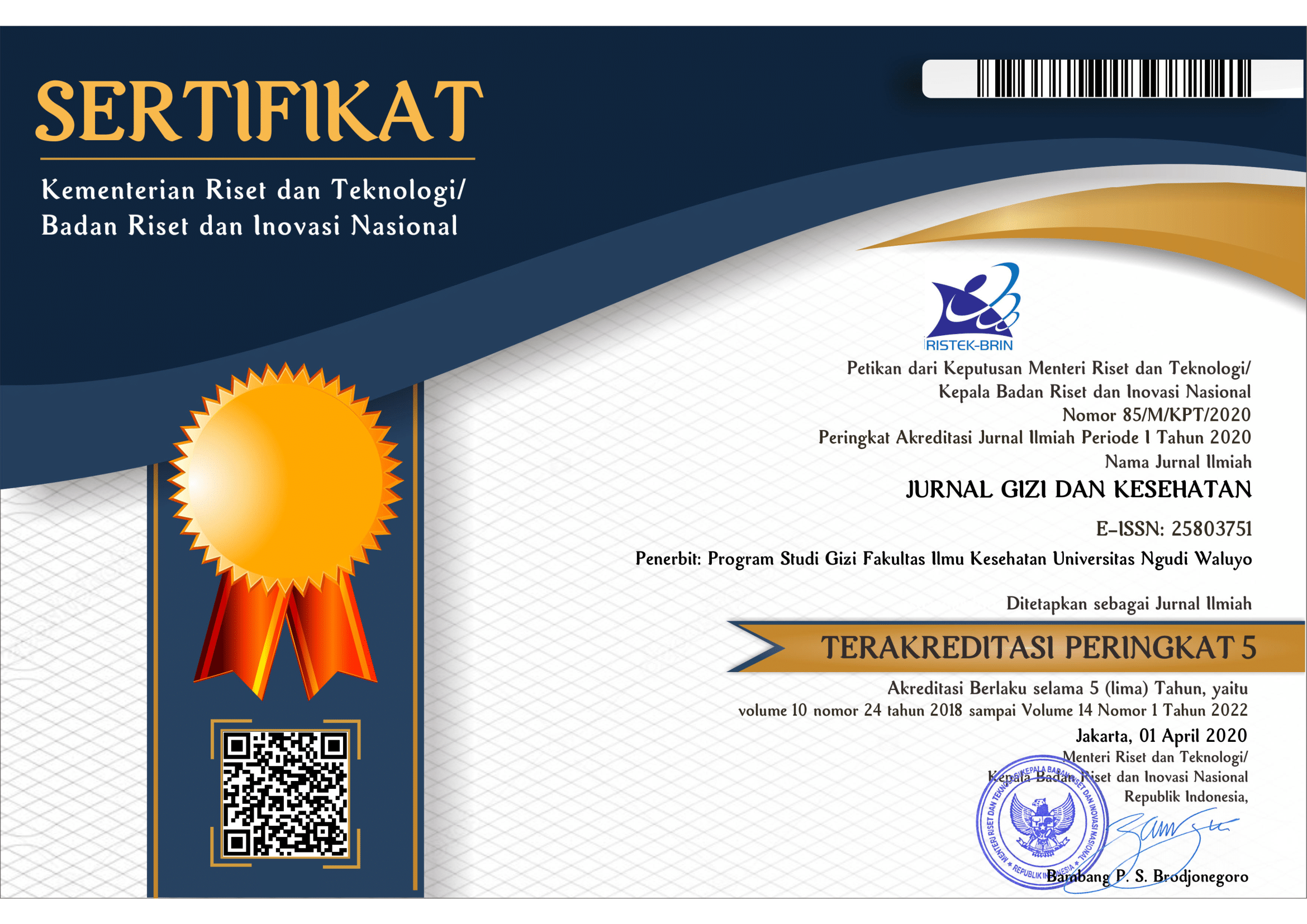Hubungan Obesitas Sentral dengan Kejadian Hipertensi pada Wanita Usia Produktif
The Relationship between Central Obesity and Hypertension among Woman of Productive Age
Abstract
Overweight or obesity occurs due to the imbalance between energy intake and expenditure. Several degenerative diseases such as hypertension and cardiovascular disease are associated with obesity. The development of these diseases does not only occur in the elderly but also in the productive age. This study aims to analyse the relationship between central obesity and the incidence of hypertension in women of productive age. Cross sectional design was used in this study involving 343 respondents selected through purposive sampling. The data were obtained by direct interview, anthropometric assessment, and blood pressure measurement. The data analysis used chi-square test to determine the relationship between variables. The result of the study showed that the total of 69.4% of respondents had an age range of 50-59 years. Most of respondents had an education level of elementary school (50.7%). There were 28.0% of respondents who had family history of hypertension. Most of respondents had central obesity status as assessed by waist circumference. The incidence of hypertension based on systolic and diastolic blood pressure was 33.5% and 32.7% respectively. There was a significant relationship between waist circumference and family history of hypertension with systolic and diastolic blood pressure (p-value <0.05). The conclusion of the study is that women with central obesity and family history of hypertension are at risk of having high blood pressure.
ABSTRAK
Ketidakseimbangan antara asupan dan pengeluaran energi adalah penyebab utama kelebihan berat badan dan obesitas. Beberapa penyakit degeneratif seperti hipertensi dan penyakit kardiovaskular memiliki kaitan dengan adanya obesitas pada seseorang. Perkembangan penyakit ini tidak hanya terjadi pada lansia saja tetapi juga pada usia produktif. Penelitian ini bertujuan untuk menganalisis hubungan antara obesitas sentral dengan kejadian hipertensi pada wanita usia produktif. Desain Cross Sectional digunakan dalam penelitian ini dengan melibatkan sebanyak 343 responden yang dipilih melalui purposive sampling. Data didapatkan melalui wawancara secara langsung, penilaian antropometri, dan pengukuran tekanan darah. Analisis data menggunakan uji chi-square untuk mengetahui hubungan antar variabel. Sebanyak 69.4% responden memiliki rentang usia 50-59 tahun. Sebagian besar responden memiliki Tingkat Pendidikan setara SD (50.7%). Terdapat 28.0% responden yang memiliki riwayat penyakit hipertensi dari orang tua. Sebagian besar responden mengalami obesitas sentral yang dinilai melalui lingkar pinggang. Kejadian hipertensi pada responden berdasarkan tekanan darah sistolik dan diastolik adalah 33.5% dan 32.7%. Terdapat hubungan yang signifikan antara lingkar pinggang dan riwayat hipertensi dengan tekanan darah sistolik dan diastolik (p-value < 0.05). Kesimpulan penelitian adalah wanita dengan obesitas sentral dan riwayat hipertensi dari orang tua berisiko memiliki tekanan darah yang tinggi.
Downloads
References
Anuradha, R., Hemachandran, S. and Dutta, R. (2012) ‘The Waist Circumference measurement: A simple method for assessing the abdominal obesity’, Journal of Clinical and Diagnostic Research, 6(9), pp. 1510–1513. Available at: https://doi.org/10.7860/JCDR/2012/4379.2545.
Badan Pusat Statistik Indonesia (2022) ‘Statistical Yearbook of Indonesia’, Statistik Indonesia 2020, 1101001, p. 790. Available at: https://www.bps.go.id/publication/2020/04/29/e9011b3155d45d70823c141f/statistik-indonesia-2020.html.
Canning, K.L. et al. (2014) ‘Relationship between obesity and obesity-related morbidities weakens with aging’, Journals of Gerontology - Series A Biological Sciences and Medical Sciences, 69(1), pp. 87–92. Available at: https://doi.org/10.1093/gerona/glt026.
Cerhan, J.R. et al. (2014) ‘A pooled analysis of waist circumference and mortality in 650,000 adults’, Mayo Clinic Proceedings, 89(3), pp. 335–345. Available at: https://doi.org/10.1016/j.mayocp.2013.11.011.
Di Giosia P et al. (2018) ‘Gender Differences in Epidemiology, Pathophysiology, and Treatment of Hypertension. Current Atherosclerosis Reports [revista en Internet] 2018 [acceso 26 de octubre de 2020]; 20(3): 13.’, Springer [Preprint].
Hall, M.E. et al. (2023) ‘Hypertension in Chronic Kidney Disease’, Pediatric Hypertension: Fifth Edition, pp. 477–498. Available at: https://doi.org/10.1007/978-3-031-06231-5_47.
Jiang, S.Z. et al. (2016) ‘Obesity and hypertension’, Experimental and Therapeutic Medicine, 12(4), pp. 2395–2399. Available at: https://doi.org/10.3892/etm.2016.3667.
Junjie Xiao (2020) Exercise and Schizophrenia, Advances in Experimental Medicine and Biology. Available at: https://doi.org/10.1007/978-981-15-1792-1_21.
Kemenkes RI (2019) ‘Laporan Nasional Hasil Riset Kesehatan Dasar (Riskesdas) Indonesia tahun 2018’, Riset Kesehatan Dasar 2018, pp. 68–72.
Khairani, N., Effendi, S.U. and Utamy, L.W. (2018) ‘Aktivitas Fisik dan Kejadian Obesitas Sentral pada Wanita di Kelurahan Tanah Patahkota Bengkulu’, CHMK Nursing Scientific Journal, 2(1), pp. 7823–7830.
Kusnandar, V.B. (2023) Piramida Penduduk Indonesia 2022, Usia Produktif Mendominasi. Available at: https://databoks.katadata.co.id/datapublish/2023/07/05/piramida-penduduk-indonesia-2022-usia-produktif-mendominasi.
Leggio, M. et al. (2017) ‘The relationship between obesity and hypertension: An updated comprehensive overview on vicious twins’, Hypertension Research, 40(12), pp. 947–963. Available at: https://doi.org/10.1038/hr.2017.75.
Li, A. Le et al. (2019) ‘The effect of body mass index and its interaction with family history on hypertension: A case-control study’, Clinical Hypertension, 25(1), pp. 1–8. Available at: https://doi.org/10.1186/s40885-019-0111-2.
Ndanuko, R.N. et al. (2016) ‘Dietary patterns and blood pressure in adults: A systematic review and meta-analysis of randomized controlled trials’, Advances in Nutrition, 7(1), pp. 76–89. Available at: https://doi.org/10.3945/an.115.009753.
PERKI (2017) Panduan Tata Laksana Dislipidemia. Jakarta: Perhimpunan Dokter Spesialis Kardiovaskuler Indonesia.
Ponto, L., Kandou, G. and Mayulu, N. (2016) ‘Hubungan Antara Obesitas, Konsumsi Natrium, Dan Stres Dengan Kejadian Hipertensi Pada Orang Dewasa Di Puskesmas Tompaso Kabupaten Minahasa’, Fakultas Kesehatan Masyarakat Universitas Sam Ratulangi, pp. 115–129.
Purnell, J.Q. (2018) ‘Definitions, Classification, and Epidemiology of Obesity - Endotext - NCBI Bookshelf’, pp. 22–28.
Ranasinghe, P. et al. (2015) ‘The influence of family history of Hypertension on disease prevalence and associated metabolic risk factors among Sri Lankan adults Chronic Disease epidemiology’, BMC Public Health, 15(1), pp. 1–9. Available at: https://doi.org/10.1186/s12889-015-1927-7.
Ren, H. et al. (2023) ‘Association of normal-weight central obesity with hypertension: a cross-sectional study from the China health and nutrition survey’, BMC Cardiovascular Disorders, 23(1), pp. 1–11. Available at: https://doi.org/10.1186/s12872-023-03126-w.
Ross, R. et al. (2020) ‘Waist circumference as a vital sign in clinical practice: a Consensus Statement from the IAS and ICCR Working Group on Visceral Obesity’, Nature Reviews Endocrinology, 16(3), pp. 177–189. Available at: https://doi.org/10.1038/s41574-019-0310-7.
Septiyanti, S. and Seniwati, S. (2020) ‘Obesity and Central Obesity in Indonesian Urban Communities’, Jurnal Ilmiah Kesehatan (JIKA), 2(3), pp. 118–127. Available at: https://doi.org/10.36590/jika.v2i3.74.
Singh, S., Shankar, R. and Singh, G.P. (2017) ‘Prevalence and Associated Risk Factors of Hypertension: A Cross-Sectional Study in Urban Varanasi’, International Journal of Hypertension, 2017. Available at: https://doi.org/10.1155/2017/5491838.
Sugeng Wiyono (2018) Surveilans penyakit dan gizi. Jakarta: Sagung Seto.
Tana, L. and Ghani, L. (2015) ‘Determinan Kejadian Cedera pada Kelompok Pekerja Usia Produktif di Indonesia’, Buletin Penelitian Kesehatan, 43(3), pp. 183–194. Available at: https://doi.org/10.22435/bpk.v43i3.4346.183-194.









